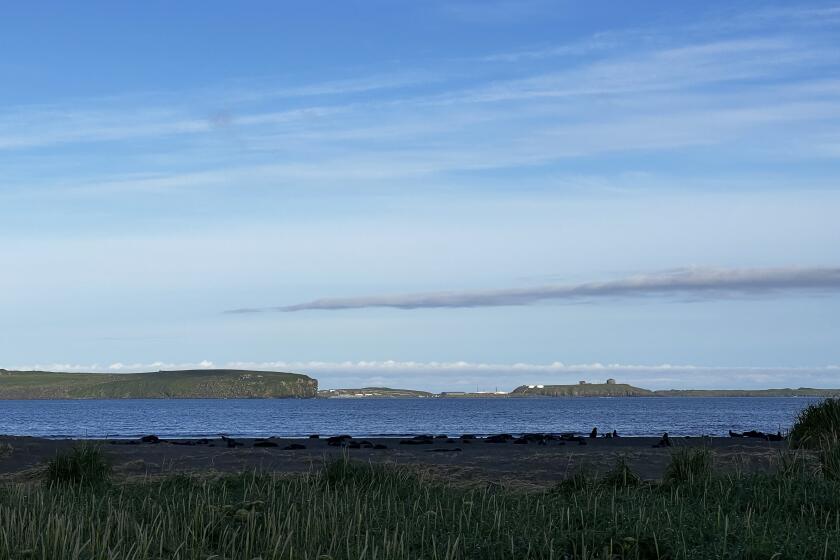Dispute before Iran elections
Moderate Iranian politicians barred from participating in upcoming parliamentary elections vowed Thursday to fight the disqualifications and threatened to boycott the vote.
Iranian authorities this week barred nearly one-third of the 7,240 candidates who had applied to run in March 14 legislative elections. Officials said some of those disqualified were involved in embezzlement or fraud, sympathized with terrorist groups or had a “tendency toward perverted cults.”
But those banned included many members of the so-called reformist camp who tried to change Iran’s political culture in the late 1990s and who are hoping to wrest at least one branch of government from conservative hard-liners. They vowed to challenge the rejections by the Guardian Council, a committee of six clerics and six lawyers that vets all political candidates and laws for adherence to Islamic principles.
“Now only 30% of our candidates are able to stand, which does not guarantee a fair and free election,” said Ismail Gerami-Moghadam, a lawmaker with the National Trust, a reform group headed by former presidential candidate Mehdi Karroubi. “We will wait 10 days from now to see the result of our petitions for requalification. Then we’ll decide whether to participate or boycott the election.”
Among those barred were 190 of 200 candidates of the main reform group, the Islamic Participation Front; 230 of about 300 National Trust candidates; and all candidates of the Islamic Revolution Mujahedin Organization.
Rejected candidates have until Sunday to file appeals with supreme leader Ali Khamenei, who has been unsympathetic to the reformists’ cause and refused to reverse disqualifications before the 2004 elections. A final list of candidates will be issued March 5.
Khamenei heads a theocratic Shiite Muslim state with elements of a democratic republic, including regular elections for parliament and the presidency. The political elite pride themselves on high voter turnout, and a boycott could harm the election’s credibility. Iranian authorities have ruled out allowing international observers to monitor the election.
Iran’s leadership is divided among several factions, including a hard-line conservative group around President Mahmoud Ahmadinejad, a so-called pragmatic faction close to former President Hashemi Rafsanjani and a moderate wing represented by ex-President Mohammad Khatami.
Iran’s constitution does not recognize political parties. But authorities regulate political groups and even fund some organizations loyal to the 1979 Islamic Revolution. These groups battle one another for power and influence through the parliament, although ultimate authority rests with Khamenei, a high-ranking cleric.
The 290-seat parliament, called the Majlis, has the power to propose and pass legislation and to act as a check on the president, as it did during Khatami’s eight-year rule. Ahmadinejad usually manages to muster a majority in parliament for his policies. But a reformist swell in the March vote could challenge his socially conservative domestic program and ideologically charged international policies, which many compare to those of the early years of the revolution.
The president’s allies fared poorly in municipal elections in 2006, and hard-liners have sharpened their rhetoric against liberals, accusing them of being dupes of Washington. “America supports every group that operates within its interests,” the conservative daily Siasat-e-Rooz said in an editorial. “Since the beginning of the Islamic Revolution, America supported the reformists and the question is, ‘Why?’ ”
But Ahmadinejad also faces a mounting challenge from within the right.
Gholam Ali Haddad Adel, the parliament speaker, recently publicly took issue with the president in a dispute over the budget and constitution. Former nuclear negotiators Hassan Rowhani and Ali Larijani, both powerful conservative politicians, former Intelligence Minister Ali Fallahian and former Foreign Minister Akbar Velayati are seeking election. All are opponents of Ahmadinejad.
Analysts say Larijani, running from the holy city of Qom, will probably win and make a push to become the next speaker and use the post as a platform to criticize Ahmadinejad in preparation for the 2009 presidential election.
Larijani is backed by conservatives who approve of Ahmadinejad’s policies but dislike his style.
“I decided to run for the elections on the advice of supreme clerics,” Larijani told reporters.
--
Special correspondent Mostaghim reported from Tehran and Times staff writer Daragahi from Beirut.
More to Read
Sign up for Essential California
The most important California stories and recommendations in your inbox every morning.
You may occasionally receive promotional content from the Los Angeles Times.










